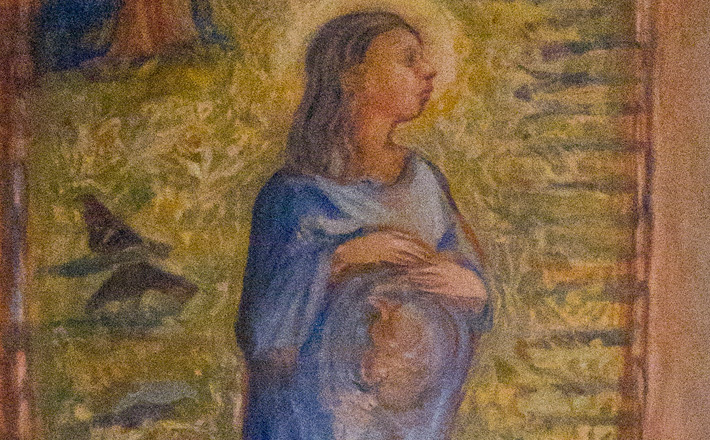Commentary on Isaiah 7:10-16
Again, the Lord spoke to Ahaz, “Ask a sign of the Lord your God; let it be deep as Sheol or high as heaven.”
But Ahaz said, “I will not ask, and I will not put the Lord to the test.”
“You have spoken well, King Ahaz,” said God. Well, no. That’s not what God said. But isn’t that what God should have said? Surely God knew the commandment from Torah, the commandment Jesus remembered in the wilderness when he was tempted by Satan. “Do not put the Lord your God to the test.” (Matthew 4:7) So why not commend King Ahaz for getting it right?
But there is no applause for Ahaz. The word God speaks through the prophet Isaiah is a different word entirely:
Is it too little for you to weary mortals, that you weary my God also?
Therefore, the Lord God will give you a sign. Look, the young woman
is with child and shall bear a son, and shall name him Immanuel.
Isaiah questions the king’s sincerity. Who does King Ahaz mean when he speaks of “the Lord?” Isaiah claims a different deity: “Is it too little for you to weary mortals, that you weary my God also?” My God and your God may not be the same. Perhaps the king had become like those of us who live in these latter days who have given up looking for any signs beyond those we can make ourselves. We’re in charge. Perhaps we’re afraid that if God gave us a sign, it would not be what we wanted. Better not to ask at all. Right, King Ahaz?
Wrong, says God. I myself will give you a sign even if you don’t ask for one. A child. Immanuel. O my people, are you still waiting for the Warrior God — and now you are terrified that the gods of Syria are greater than I am? Must I be like you, only bigger? Must I be vengeful in a world obsessed with getting even? I myself will give you a sign: “a young woman is with child and shall bear a son and shall call him Immanuel.”
Can we see this sign? Perhaps this is the day to place a baby crib near the pulpit or at a place where people enter the sanctuary. Isaiah marked the child’s birth within his own history. The prophet says it clearly: “Look, the young woman is with child…” She’s pregnant now and she will give birth to a son. By the time this child is weaned — not nursing, but eating curds and honey — the nations whose kings you fear will be deserted. Isaiah’s prophecy had meaning within his own time. These words were not written for those who live on this side of the New Testament.
Yet, it was not wrong for Matthew to hear Isaiah’s prophecy pointing to Jesus as “Immanuel, that is God-with-us.” Matthew found Jesus in Isaiah, even though Jesus’ name isn’t in the text. The stories of God’s movement in history invite each generation to enter the story. African slaves in America heard stories of God delivering the Hebrew people from bondage in Egypt. They heard themselves in that story in a way their slave masters did not. The exodus became an African American story and Miriam’s song became a freedom song of deliverance from the auction block. Every generation enters the pages of scripture with longing and need, expectation and hope. This is why we call the Bible a living word.
Of course, Matthew also found a virgin rather than a young woman. He was working with a Greek translation of the Hebrew text and the Greek translator had chosen parthenos, a word that could mean either “young woman” or “virgin.” For some people this will be a huge discrepancy.
Mary has to be a virgin no matter who that young woman was in Isaiah. “I understand why some people become grim when the virginity of Mary is questioned,” writes John Vannorsdall. “Somehow they conceive of the Bible as a house of cards which, when one is removed, the whole of it collapses. I find the Bible to be made of sturdier stuff… pinned with the pegs of insights, and bearing within it the yearning of God to disclose himself.”1[i] The focus for both Isaiah and Matthew is the child, Immanuel. Let’s not spend so much time on virginity that we miss the child.
My colleague Brigitte Kahl teaches New Testament at Union. She grew up in the former East Germany. Like many ordinary Germans, her father had served in Hitler’s army. When that army invaded Russia the German soldiers wore belt buckles inscribed with the words “Gott mitt unz.” God with us.Unless we see the sign of the child it is all too easy to turn “Immanuel, God-with-us” into a call to defeat our enemies.
God’s sign of a child surprised a king and an unwed father named Joseph. This sign matters in a world that continues to worship a vengeful God who can crush our enemies. Seeing the child as sign of God-with-us paints a different picture:
The Word comes as a child who can be received and cannot hurt us; a Word that does not make us afraid. I am prepared for the anger of God; I believe that God has a right to wrath. What is so amazing is that when God does come among us, whatever God’s hurt or indignation, God comes not with violence, but as a child, vulnerable to our further hurt that we might receive rather than fear him.2
On this last Sunday of Advent we invite the congregation to recall the images shared throughout this season. You may decide to sing the four stanzas of “O Come, O Come, Immanuel” shared through the season or this last verse about the child:
O come, dear child of Mary, come,
God’s Word made flesh within our earthly home;
Love stir within the womb of night,
Revenge and hatred put to flight.
Rejoice, rejoice! Take heart and do not fear,
God’s chosen one, Immanuel, draws near.
—
1 John Vannorsdall, Dimly Burning Wicks: Reflections on the Gospel After a Time Away (Minneapolis: Fortress Press, 1982), 25.
2 Ibid.


December 22, 2013